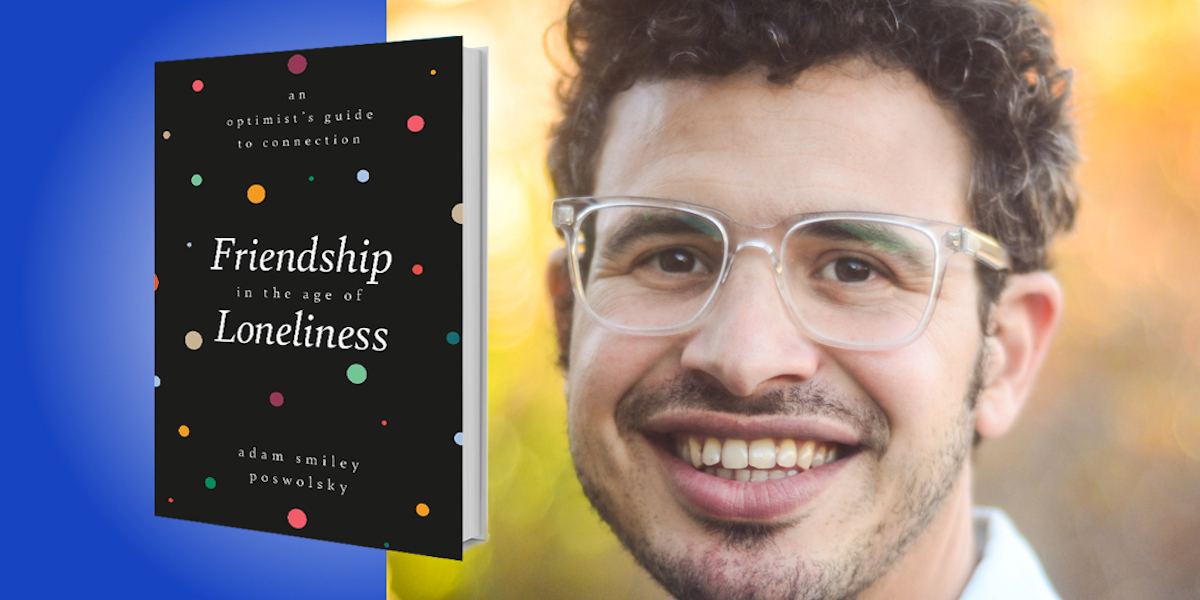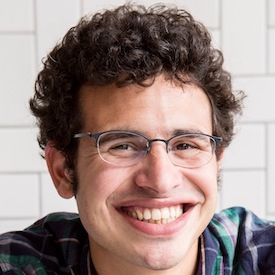Adam Smiley Poswolsky is a millennial workplace expert, motivational speaker, and author of The Quarter-Life Breakthrough and The Breakthrough Speaker. His TEDx talk on “the quarter-life crisis” has been viewed more than 1.5 million times, and he has spoken in fifteen countries about millennials, multigenerational engagement, and fostering connection and belonging in the workplace. Smiley’s work has been featured in The New Yorker, the Washington Post, USA Today, Fast Company, Forbes, Cosmopolitan, CNN, and the World Economic Forum.
Below, Adam shares 6 key insights from his new book, Friendship in the Age of Loneliness: An Optimist’s Guide to Connection (available now from Amazon). Listen to the audio version—read by Adam himself—in the Next Big Idea App.
1. Spend more time with your friends.
In response to the mounting pressures of modern life, we’ve been prescribed every potential cure under the sun: Quit social media, download a meditation app, declutter your house, become a badass, use a bullet journal, go paleo, go keto, get a Peloton, do CrossFit, do nothing—the list goes on. Yet we rarely talk about the simple power of spending more time with friends. We look at our phone every twelve minutes, and spend fifty minutes a day on Facebook and Instagram; yet we spend just four percent of our time with friends.
Research shows that social connections play a vital role in our health, influencing everything from our cardiovascular system to our immune system. Social support increases our survival by 50 percent—it’s as beneficial to our health as giving up smoking 15 cigarettes a day. People with close friends are happier, healthier, and live longer than people who lack strong social bonds. Friendship is not something we should only think about after work at happy hour, on the weekends when we have two hours to squeeze in a walk with a buddy. It’s something that should influence every decision we make. Always ask yourself: How can I be a better friend? How can I invest in the people in my life? How can I put friendship at the center of my life?
“Social support increases our survival by 50 percent—it’s as beneficial to our health as giving up smoking 15 cigarettes a day.”
2. Invest in friendship.
Friendships aren’t a given when you’re an adult—they take time and energy and work. You can’t swipe right or press a “like” button or send an emoji to find meaningful connection. Research by Jeffrey Hall suggests that you need to spend at least ninety hours with someone before they consider you a real friend, and more than two hundred hours for someone to be a close friend.
So start small—be curious. Ask thoughtful questions more interesting than “what do you do?” Build intimacy slowly, and be proactive. If you meet someone interesting at work or an event, let them know! Tell them you are interested in getting to know them, and invite them to hang out some time—perhaps to take a walk, or have a cup of coffee.
A good trick is to always go on a “second date.” Just like in dating, if someone piques your interest, you want to keep the fire burning. You could have a monthly potluck, or a recurring book club, or a “Monday Night Activity Club.” This keeps it simple, and you always have an event to invite folks to. Plus you’re building community, since all of your guests at the potluck will get to meet each other, and they might become friends too.
3. Go deep rather than wide.
I often feel overwhelmed trying to maintain dozens of casual surface-level relationships. During the pandemic, this feeling became even more pronounced, as I felt like I only had bandwidth for my closest friends. This mirrors social research, which has found that close friends are the ones that matter most. It’s about the quality of the relationships you have, not the quantity.
“If you meet someone interesting at work or an event, let them know! Tell them you are interested in getting to know them.”
I like to make time for “deep hangs” with my friends, where you have space to get vulnerable with each other, lose track of time, and get into a friendship flow state where you’re connecting on a deep, personal level. It’s less catching up about work and the type of highlights you share on social media, and more talking about our hopes, dreams, and fears.
Here are a few things to keep in mind when planning a deep hang with a friend:
- Presence: Put away your phone and really just be with your friend.
- Don’t double book: If you’re having a deep hang, clear the calendar for the whole day to allow for spontaneity.
- Be intentional about place: Deep hangs should include adventures to beautiful spaces and places. A waterfall, a secret garden, your favorite hike, a mini road trip, a spot out of town—all of these are more exciting venues than your local coffee shop.
4. Become a correspondence queen.
Avoid the “out-of-touch” guilt spiral, where you never reach out to a friend because you haven’t spoken in a while. Everyone is busy; being busy is not an excuse for not staying in touch. So be proactive—pick up the phone and call. Invite your friends to hang out more often. Figure out what your preferred communication medium is, and how your friends like to communicate. It might be spontaneous phone calls, or texting during the day, or sending audio or video messages. For me, it’s writing letters and postcards. I love receiving mail that’s not bills or junk. I’m also a fan of Tribute, which makes it easy to create a collaborative video montage that you can give as a gift on a birthday, graduation, anniversary, or work milestone.
“Being busy is not an excuse for not staying in touch. So be proactive—pick up the phone and call.”
Whatever your communication medium is, the important thing is that you tell your friends you appreciate them—all the time. If there’s one thing we learned during the pandemic, it’s that all of us could use a little more love and support in our lives. Studies have shown that a regular practice of expressing gratitude changes the structure of the brain, makes us healthier and happier, and can be associated with better sleep and lower levels of anxiety and depression.
5. Make friendship a ritual.
Rituals foster meaning, connection, and transformation, and they can deepen your friendships. Recurring rituals create a regular heartbeat of connection that all of us need. Plus, rituals support a psychological principle known as the mere exposure effect, which reveals that the more we see someone, the more we like them. This is why signing up for ongoing activities like a book club, improv group, or language class can be far more valuable than going out to a bar or a one-off event.
The more creative you get about how you spend time with your people, the more nourishing those relationships are going to be. Go on overnight adventures where you can be really present together. Go on platonic friend dates where you dress up, surprise your friend, give them flowers, and buy them dinner. Men, be intentional about how you spend time with other men; seek out male friendships where you can be vulnerable, open up, and talk about your emotions. Whether it’s a nightly gratitude text to a friend, a Tuesday lunch date, or an annual weekend in nature, establish traditions that make you come back to the people and places you love most.
“The more creative you get about how you spend time with your people, the more nourishing those relationships are going to be.”
As many companies shift to remote or hybrid work, workplace friendships matter now more than ever. In fact, employees who have a best friend at work are seven times more engaged. So try adding little moments of ritual to your meetings and weekly calendars. Allow employees to share a highlight from their weekend, or their favorite lesson learned from their grandparents, before you jump into your Monday morning check-in. Think about incorporating a “Gratitude Fridays” for your colleagues to share gratitude and praise for their co-workers, or even a “Mistake Wednesdays” for colleagues to talk about something they got wrong recently, and what they learned from the experience.
6. Be a Minister of Loneliness in your community.
In 2018, Britain appointed a Minister for Loneliness to help combat widespread loneliness as a public health concern. It would be nice if every country in the world had a Minister for Loneliness or a Department of Human Connection, but this seems unlikely. It became abundantly clear during the pandemic that the U.S. is lacking a social safety net when it comes to taking care of one another’s emotional well-being and mental health. A third of Americans showed signs of clinical anxiety or depression during the pandemic, and loneliness levels increased to alarming levels for young adults and working mothers.
We can’t wait for the government to solve loneliness; we have to become human connection agents in our own communities. Find ways to get to know your neighbors, and invest in your local community. Studies show that knowing as few as six neighbors reduces the likelihood of feeling lonely. Seek to understand the perspectives of people who come from different backgrounds. Join what I call “exponential communities,” communities that believe in the beauty of your dreams and have an exponential impact on your potential. Always ask how you can pass the torch: Host gatherings, share opportunities, volunteer your time, redistribute resources to those who need them most, and be an inclusive and engaged citizen. Human connection is healthy for you, and healthy for the planet.
To listen to the audio version read by Adam Smiley Poswolsky, download the Next Big Idea App today:































